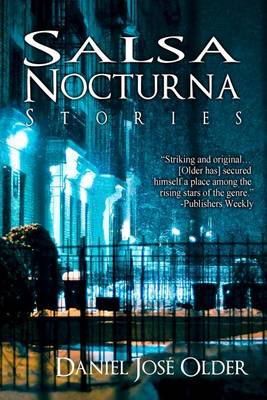
brokentune
Written on Sep 11, 2016
Please, please don’t let my star-rating trick you into thinking that this was not a good book! I loved, loved, loved the writing in this collection of stories that focus on Carlos and his friends and colleagues who work for the Council of the Dead and act like a night watch over the Bronx and its most vulnerable inhabitants. No, the writing was gorgeous. The problem I had with the book is simply that paranormal/urban fantasy doesn’t excite me much. So, despite my love of Carlos and Gordo there were only two stories that really grabbed my attention: the title story Salsa Nocturna and a story a little later in the book called Magdalena.
Salsa Nocturna introduces us to the character of Gordo, an old man who watches over the abandoned children at an overnight centre.
It’s called a non-profit but everyone at the office is obviously making a killing. The kids are called minority and emotionally challenged, but there’s a lot more of them and they show a lot more emotions than the staff. It’s a care facility, but the windows are barred.
Gordo is a gentle giant who loves music, life, and a sense of humor:
I always take my high blood pressure pills with a side of bacon or sausage, you know, for balance.
…
“Gordo,” Janey says, puffing her way up the last steps to where I stand chuckling. They call me Gordo because I am gigantic in the old world of rhumba and salsa, a legend. Also, because I am fat.
…
Untold stores of ferocious grace remain in these old bones, however hidden beneath lard and cholesterol.
He keeps watch over the kids, even though never envisaged this to be his calling.
I’m not bragging but even teenagers like me. They don’t admit it most of the time, but I can tell. They’re just like overgrown, hairy five year olds anyway. Also, notoriously poor small talkers.
And it’s not just thugs and hypothermia that he keeps at bay for them, he also tries to help them heal from the ghosts of their past, any way he can. He’s a musician by profession and through Gordo’s eyes we get to see some of the more sensitive side of the night life:
It was a mambo, but laced with the saddest melody I’ve ever heard – some unholy union of Mozart, Coltrane and Perez Prado that seemed to speak of many drunken nights and whispered promises. It tore into me, devoured me and pieced me back together a brand new man.
Of course, there are also real ghosts and ghoulies, some of which are posing a threat:
The thing ate a hipster. Hipster is what they call these new-fangled white people that’ve been moving onto the block – the ones with the tight pants and big glasses.
The other character I loved, and who came to shine in the story Magdalena, was Carlos. Carlos is introduced in the first story as a tough guy who is somewhat undead or unliving or near dead and who is an agent with the council of the dead. Later on in the stories, we learn more about the characters and they become rounded individuals – did I mention the writing was gorgeous?
As an agent, he patrols the streets and has to put up with his share of ghosts, monsters, shape-shifters and politics:
As I’m sure you’ve noticed, death isn’t the great equalizer it’s made out to be. Layers of hierarchy remain, interlaced by the tangled webs of power and privilege. The dead, after all, are human, and what could be more human than an unnecessarily oppressive bureaucracy at the end all be all of existence?
The more I read about Carlos, the less he became this rough-and-ready tough guy. The more of his story was revealed, the more vulnerable he became, the more he became a human being – even though he was dead. And that is what I loved most about Older’s stories: he managed to tell truths (or perceived truths) through the medium (haha!) of a paranormal environment. But the thing is, that the paranormal veneer really was only for show and the stories themselves were as realistic and hard-hitting as if Older had chosen to write in a genre-that did not rely on the supernatural as a gimmick or point of interest. For me the book would have worked better if the paranormal element had been left out, but, of course, I do realise that this is Older’s chosen genre, so I can only applaud him on managing to completely draw me into a genre that I usually avoid.
I was a pretty devout atheist in life. That night in the prop dock was probably the one prayer I could put my name to. Since I died I’m not so sure. Hard to deny that there’s something else out there when you are that something else. Cane, on the other hand, was a true believer all through life and still hangs out in the back of some church in Inglewood on Sunday mornings, smoking his hand rolled cigarettes and trying not to get mistaken for the Holy Spirit. He says every soul is like a tiny shard of glass that reflects God. He says when you’re dead, you’re just a soul, and the reflection is even stronger, not muddled by all that flesh and blood and living people shit.
